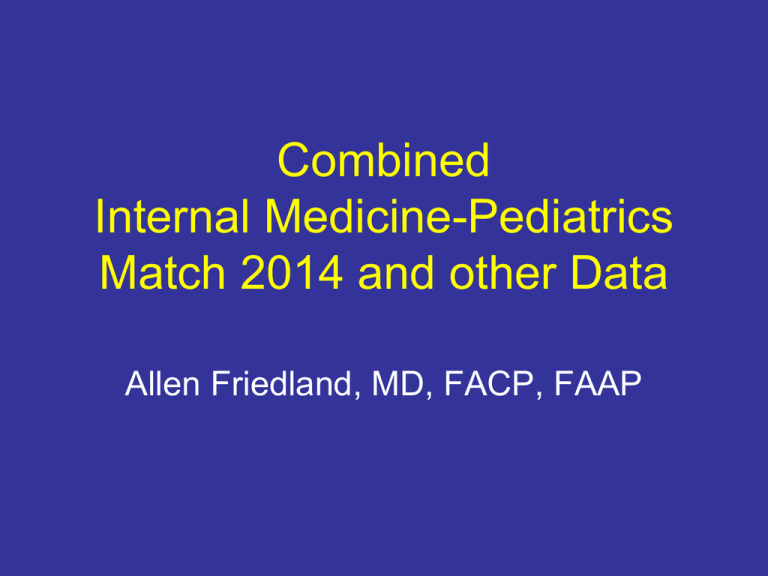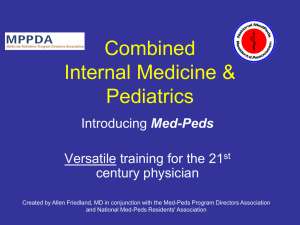2014 Match Data - The National Med
advertisement

Combined Internal Medicine-Pediatrics Match 2014 and other Data Allen Friedland, MD, FACP, FAAP How many intern positions and med-peds programs are there in the country? Positions Programs and Number of Positions of Med-Peds Programs 500 450 400 350 300 250 200 150 100 50 0 456 374 400 359 Programs 161 Positions 106 94 78 79 54 2014 2013 2012 2011 2010 2009 2008 2007 2006 2005 2004 2003 2002 2001 2000 1999 1998 1995 1990 1985 1980 National Resident Matching Program 2014 Does med-peds fill in the match (NRMP) well? Med-Peds Match 2014 (79 programs with 374 positions) NE: 2 spots MI(6): 26 spots MN: 12 spots KY(2): 10 spots WA IN: 12 spots OH(4): 25 spots WI (2): 8 spots IL(5): 24 spots ME: 3 spots NY(4): 18 spots MA(4): 19 spots CT: 4 spots RI: 4 spots PA(4): 16 spots NJ(2): 5 spots DE: 4 spots DC: 4 spots MD: 8 spots ND MT ME MN VT WI OR ID SD WY NH NY MI MA RI CT PA IA NE NV NJ IL UT OH IN CO DE WV KS KY MO VA MD DC CA TN AR OK NM AZ SC MS AL CA (4): 18 spots CO: 4 spots UT: 2 spots AZ: 6 spots NC TX GA LA HI FL OK(2): 6 spots AR: 6 spots TX(2): 14 spots LA(3):14 spots MO (3): 13 spots KS: 2 spots VA:6 spots WV(3): 6 spots NC(3):18 spots MS: 4 spots AL: 7 spots FL(2): 8 spots PR TN(2):14 spots SC(2):8 spots P. Rico: 2 spots Med-Peds Overall Fill Rate thru the Match 500 456 405 Positions 400 400 273 200 351 374 365 420 300 97% 378 352 363 362 345 Programs 161 Positions Filled 163 100 121 81 0 106 93 94 82 77 79 5 2014 2013 2012 2011 2010 2009 2008 2007 2006 2005 2004 2003 2002 2001 2000 1999 1998 1995 1990 1985 1980 National Resident Matching Program 2014 Overall Fill Rates By Residency In NRMP Match (US and IMG) 100% 95% Int. Med. Percent Fill 90% 85% MedPeds 80% Peds 75% Family Med 70% 65% Primary Care 60% 2014 2013 2012 2011 2010 2009 2008 2007 2006 2005 2004 2003 2002 2001 2000 1999 1998 1995 1990 1985 National Resident Matching Program 2014 What percent of intern positions are matched with US allopathic graduates? The NRMP uses the term “US Seniors” to denote US allopathic seniors Fill Rates By Residency In Match (US Seniors only) 76% 284 interns 90% 85% 80% Int. Med. Percent Fill 75% 70% MedPeds Peds 65% 60% 55% Family Med. Primary Care 50% 45% 40% 2014 2013 2012 2011 2010 2009 2008 2007 2006 2005 2004 2003 2002 2001 2000 1999 1998 National Resident Matching Program 2014 What are the absolute numbers of matched interns from allopathic and osteopathic medical schools? US Graduates (allopathic) Matching into Med-Peds 387 400 350 312 Applicants 300 284 250 241 200 150 100 137 2014 2013 2012 2011 2010 2009 2008 2007 2006 2005 2004 2003 2002 2001 2000 1999 1998 1997 1996 1995 1994 1993 1992 1991 1990 1989 National Resident Matching Program 1989-2014 US Graduates (Osteopathic) Matching into Med-Peds 40 35 34 Applicants 30 25 24 20 20 15 10 27 27 21 24 21 21 21 13 5 0 2004 2005 2006 2007 2008 2009 2010 2011 2012 2013 2014 National Resident Matching Program 2004-2014 Total Allopathic Applicants to ERAS Compared to Those That Rank and Match into Med-Peds (NRMP) 500 482 434 450 409 405 400 Applicants Allopathic applicants to med-peds 350 374 350 300 334 338 258 284 294 250 200 2014 2013 2012 2011 2010 2009 2008 2007 2006 2005 2004 2003 2002 2001 2000 ERAS data (unpublished) with permission 2014 National Resident Matching Program 2000-2014 Allopathic graduates ranked medpeds Allopathic graduates matched to med-peds Are there regional differences in the number of applicants that apply to med-peds programs? Applicants ERAS Applicants to Med-Peds U.S. Graduates (Allopathic and Osteopathic) by Region 200 186 180 160 140 160 120 128 100 80 51 60 40 20 0 151 148 147 67 92 49 26 2014 2012 2010 2008 2006 2004 2002 2000 ERAS data (unpublished) with permission 2014 South Central Northeast West Osteopathic Applicants To Med-Peds Through ERAS 70 65 60 South Central Northeast West Total 40 30 20 10 ERAS data (unpublished) with permission 2014 20 14 20 12 20 10 20 08 20 06 20 04 20 02 0 20 00 Applicants 50 When there are unfilled positions how many are there and what part of the country are they in? Med-Peds Unmatched Positions to Total Intern Positions by Region (2006-2014) 2006 2007 2008 2009 2010 2011 2012 2013 2014 N. East 6 93 4 95 2 85 3 86 0 90 0 88 6 85 0 86 5 88 Central 7 135 7 103 11 130 4 127 2 125 0 127 6 127 1 130 3 124 South 19 123 22 126 23 119 8 115 2 118 3 123 6 122 2 124 4 132 West 0 25 0 27 0 28 2 26 0 26 0 27 0 28 0 26 0 30 Total 32 376 33 378 36 362 17 354 4 359 3 365 18 362 3 366 12 374 The numbers in each cell= Open positions/Total positions National Resident Matching Program Regional Stats 2006-2014 What are average USMLE and COMLEX scores and other important data? Summary Statistics 2011 U.S. Seniors Matched (n=302) Independent Applicants Unmatched (n=43) Matched (n=44) Unmatched (n=45) Mean USMLE 1 230 219 217 218 Mean USMLE 2 242 224 221 217 Mean # contiguous ranks 8.6 3.7 5.6 1.6 Mean number of distinct specialties ranked 1.2 2 1.8 2.2 2011 Charting the Outcome: NRMP and AAMC Average COMLEX and USMLE Osteopathic Boards Data (n=153) 2004-2014 640 620 600 580 560 540 520 500 480 460 440 420 400 250 572 538 554 240 230 230 220 214 210 200 190 COMLEX COMLEX COMLEX 1 2 3 180 USMLE 1 N=59 Med-Peds Directors Survey 2014 (unpublished) USMLE 2 N=37 Summary of Med-Peds • Depth and breadth of two disciplines that allows flexible career goals without Surgery and OB training. The perfect “double major” • Four years of training that is rigorous but humane; gives added maturity to your career • Wide variety of practice styles and settings; effective with variety of patient problems • Dual board certification in Internal Medicine and Pediatrics that is unique • Niches of special populations; cross fertilization of knowledge • More than 40 years of rich history in Med-Peds Combined Internal Medicine-Pediatrics A specialty worth consideration !!





